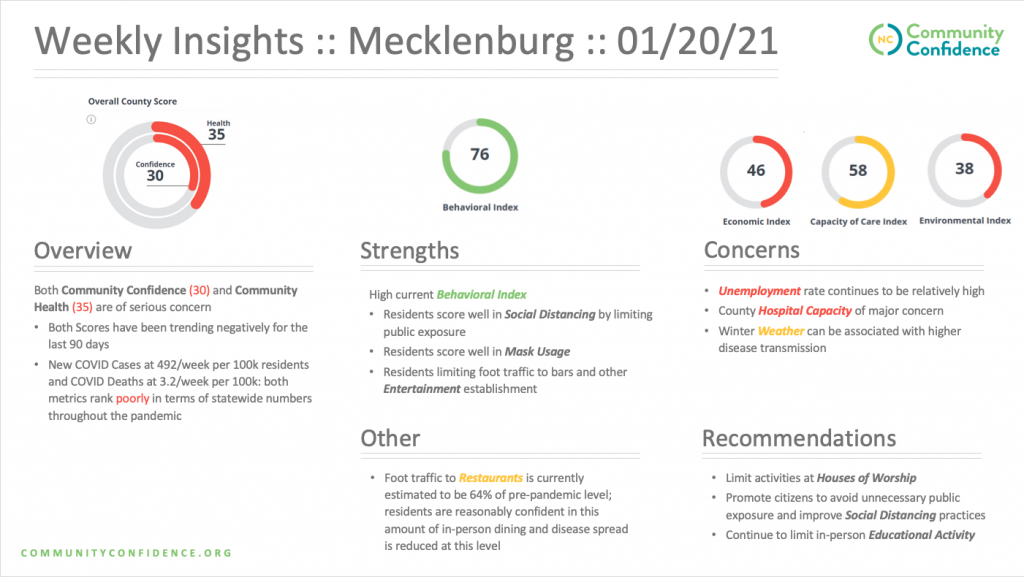

How can local government and business leaders in North Carolina balance the personal safety of their citizens with the economic wellbeing of their communities? The Digital Health Institute for Transformation partnered with Innovate Carolina on a new digital tool that offers county-level insights and answers.

Local government and business leaders are called to make the best decisions they can for their communities every day during the COVID-19 pandemic and beyond – all based on the knowledge they have in the moment. What’s the health outlook in our specific community? How do people in our area adhere to public health guidelines? When should we re-open schools and certain types of businesses? How can we balance keeping people safe with helping businesses rebound? The ability to get high-quality, timely data to make these kinds of calls is no easy task.
What if community leaders could quickly access data that accurately reflects the sentiment of their citizens? And what if they had a tool to simulate how key decisions and trade-offs could impact the wellbeing of the community and its citizens?
Such hypotheticals are now becoming realities thanks to the Digital Health Institute for Transformation (DHIT), a non-profit education and research institute that’s partnered with Innovate Carolina and the Institute for Convergent Science at UNC-Chapel-Hill to launch a digital tool called Community Confidence. This data-driven decision support tool helps government and business leaders in North Carolina counties make decisions that will benefit their communities during the pandemic and during other significant health situations.
The Community Confidence platform allows leaders to weigh local health risks against economic activity. It simulates the impact of evidence-based recommendations and indicates if decisions will be viewed positively by people in the community. Being able to see how tradeoffs and choices may affect the sentiments of their constituents gives decisionmakers insights that they haven’t had in the past.
“This tool offers the best insight you can have as a county leader and a decision maker,” says Michael Levy, chief executive officer of DHIT. “It takes into context community preferences to produce highly digestible and easy-to-understand weekly insight reports. The reports help leaders understand the health of their communities from a health care and economic perspective, allowing for objective and data-driven discussions.”
The platform – which the team built and launched in just five months – combines scientific data with community preferences. County leaders can use the tool’s customized scorecard to assess the current and future wellbeing of their communities across health, economic, environmental and behavioral factors.
“Every choice has consequences and trade-offs. What is appropriate for your community and the context of your situation may be different from another community,” says Levy, who previously served as entrepreneur-in-residence at the UNC Center for Health Innovation. “This platform gives an opportunity to juxtapose and evaluate decisions within the community. Once those decisions are matched up against best practices, you have the ability to view a health score as well as a confidence score for that decision.”

The Community Confidence platform is a collaboration between DHIT and the Institute for Convergent Science and Innovate Carolina at UNC-Chapel Hill. The tool originated as a pilot project funded by the North Carolina Policy Collaboratory as part of the 2020 COVID-19 Recovery Act, which was established by the North Carolina General Assembly (NCGA) to deploy the collective research and policy expertise of UNC System faculty and staff for practical use. More than 85 research projects from across 14 UNC System schools received funding from the legislation. As a result, $29 million was appropriated by the NCGA to the Collaboratory in May 2020 to support research on treatment, community testing and prevention of COVID-19. Community Confidence is among a subset of 15 faculty projects – selected from the more than 45 total Collaboratory-funded COVID projects at UNC-Chapel Hill – that worked with Innovate Carolina and ICS to apply a rapid innovation methodology designed to speed results.
Innovate Carolina worked hand-in-hand with Levy’s DHIT team to identify and lay out initial strategies for the effort, while helping to bolster their marketing and outreach efforts. Innovate Carolina also lent support to the platform’s data work stream, identifying and securing data sources and data pipelines.
“Innovate Carolina was an instrumental partner and supporter in this effort,” says Levy. “They provided extensive market research and market intelligence for us to stage our outreach, customer discovery and build our intelligence engine to fuel the product development cycle immediately – and target that across our pilot counties as well as across the state.”
Innovate Carolina used its ImpactX innovation methodology to guide Community Confidence through venture development. ImpactX is Innovate Carolina’s multi-step, problem-solving framework and innovation support process that helps research teams rapidly turn their knowledge into products and services.
“The Community Confidence platform is a great example of how the ImpactX process can support venture development,” says Sheryl Waddell, director of the Innovate Carolina Global Network. “Our team became part of their team. Participating in the hands-on work in partnership with the DHIT team was really rewarding and enlightening.”


The ImpactX methodology uses discovery and analysis methods to determine how research projects can make optimal use of funding to solve important problems. It provides development and support services at each step in the process to help research teams take their ideas move their ideas forward faster than might otherwise be possible.
“The Community Confidence team had a short timeframe to conduct customer discovery and then build and release a product,” adds Waddell. “They really needed all the help they could get, and the ImpactX methodology and process wonderfully fell into place.”
Now, people who use the Community Confidence tool have access to weekly insight reports. Those reports provide an overview of the health and confidence levels within specific communities, plus local strengths, concerns, and recommendations.
“We’ve created a simple view of the health of the community,” says Levy. “County leaders can see the juxtaposition between the health and confidence of the community… how the community feels about what’s going on with the various indices at play. What’s your environment, your economic reality, your behavioral reality, the capacity of care, the community health? The beauty is you get further context with dynamic data. And then if you want to do something about a specific economic index or behavioral index, you click on one of the simulators and it drives you specifically to the simulation function.”

Seven counties across North Carolina piloted and use the Community Confidence platform: Ashe, Buncombe, Gates, Mecklenburg, New Hanover, Robeson and Wake. Counties chosen for the pilot were selected based on a multitude of factors, including overall health outcomes, geography, rurality, economic distress, prosperity zones, population density, racial diversity, age, education level and number of COVID-19 cases.
“County leaders had a real interest and desire to a be involved in providing their opinions as to what they thought was needed in the tool,” says Waddell. “We heard from them about businesses that are really struggling and want to come back. Knowing we were helping to work on a product that would help get those companies back and make the community feel comfortable in visiting those businesses, our team felt like we really were able to contribute and have an impact.”
Building on momentum from the pilot, the team is developing a sustainability model to expand the platform to other counties across North Carolina, and eventually, to other states.
“The tool can help community leaders positively influence health outcomes, economic development and overall resiliency,” says Levy. “We’re going to be ready for the next pandemic with a tool that our communities are trained on and actively use.”
Beyond new pandemics, Levy says that local leaders can use the Community Confidence platform to manage other health crises, such as those associated with chronic diseases. Schools and corporations are also likely to take advantage of the technology, he says.
Levy and his team encourage county leaders to contact DHIT to add their county to the tool. For more information about the application or to access the free tool, visit the Community Confidence website.